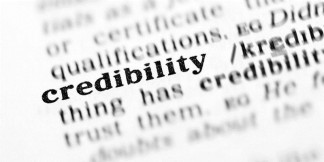 You can’t judge a book by its cover, but it seems you can judge a business by its website. Your site is the online “face” of your business; it needs to make a stellar first impression on your visitors and convince them that you’re knowledgeable and trustworthy. Easier said than done, right?
You can’t judge a book by its cover, but it seems you can judge a business by its website. Your site is the online “face” of your business; it needs to make a stellar first impression on your visitors and convince them that you’re knowledgeable and trustworthy. Easier said than done, right?
If you’re concerned that your website isn’t presenting your business in its best light, here are some tips that will help give its credibility a boost.
Make Sure Your Website Looks Professional
Web designers often refer to something known as “back button syndrome.” The idea is that most visitors will decide within 10 seconds of coming to your site whether they’re going to stick around or not. If your website looks amateurish, confusing, or “shady,” then they’re going to click that back button before they get a chance to check out your amazing content.
You need to start building credibility from the get-go, and the first thing your visitors are going to notice is how long it takes your page to load. Folks who really want or need to visit your website will sit and wait, but anyone who clicked the link on an impulse or out of curiosity will probably leave if the page takes too long to load.
Once they’re on your site, visitors want to see a clean, inviting layout that’s easy to read and navigate. If your design is cluttered or your colors are garish, you’re going to lose visitors in droves. Brand colors are great for establishing trust, as is your business name and logo.
As for the content itself, make sure that it’s spelled right and grammatically correct, and try to avoid subjecting your visitors to massive walls of text. Professional images can give your website a polished look, but don’t overuse the stock photos.
And finally, for the love of all that is good and right, don’t start autoplaying music as soon as someone lands on your homepage. Music on a website was an impressive technical feat in the late 90s, but these days most people regard it as an annoyance. That said, if you still feel that you must serenade your visitors with song, at least provide them with an easy way to shut it off.
Let Visitors Know Who You Are
People tend to be wary of anonymous, faceless websites; they want to deal with a legitimate business with real people. The easiest way to establish your legitimacy is to make your address and contact information readily available and easy to find.
You should also provide additional information to visitors who want to know more about your business. An “About Us” page is an excellent place to explain to folks who you are and what your business is about. It’s also a great place to tout press you’ve received or awards you’ve won.
You can use your website to introduce visitors to the folks who work for you. Photos and employee bios are great for personalizing your business and putting a human face on it. This also gives you the opportunity to outline the areas of expertise within your business, which will go a long way towards making you more credible.
Highlight Testimonials and Endorsements
It’s okay to toot your own horn on your website, but a little third-party corroboration can really help boost your credibility. Real testimonials from actual happy customers will demonstrate your ability to meet the needs of your clientele and show that other people have purchased your products and/or services.
You should also link to any external websites that reference your business in a positive way. Naturally, endorsements and write-ups from well-known sources (such as major news outlets, prominent business websites, or industry authorities) will carry more weight, but kudos from lesser-known sources can be quite valuable as well. The key is to show your visitors that someone other than you is saying nice things about your business.
Update Your Website Regularly
An out-of-date website can really hurt your credibility. If your information is dated or elements of your pages are displaying incorrectly, your visitors will probably assume this lack of attention to detail applies to your business as well. Make sure your contact information is current and that your hours of operation are listed correctly. And perform a regular check on your website to make sure your links are working, your images are loading, and your forms are performing as expected.
For more tips about your business website, check out some of our other blog posts.
Sources:




